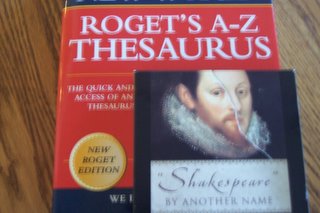" A Roget by any other name..."

"A synonym is a word you use when you can't spell the word you first thought of." Burt Bacharach Yes, I must confess that this is true for me. I'm not the greatest speller; even though I taught it for 38 years. I love synonyms and spelling them is usually not that important when I'm writing and experiencing that "creative flow". I rarely take time to look up a word in a dictionary let alone a thesaurus.
On the 18th, two days ago, Peter Mark Roget was born in 1779. He must've had a very interesting life. He was an English physician and philologist/lexicographer and is remembered to this day for his Thesaurus of English Words and Phrases (1852), a comprehensive classification of synonyms or verbal equivalents that is still popular and has never gone out of print. He also invented a "log-log" slide rule for caculating roots and powers of numbers. The first edition of the Thesaurus, which was begun in his 61st year and finished in his 73rd, was a product of his retirement from active medical practice. As early as 1805 he had compiled, for his own personal use, a small indexed catalogue of words which he used to enhance his prolific writing. The book had synonyms presented under 990 classes.
What an example for all us "retired guys". I love to write but I'm not what you'd call "prolific". If I only had more time... I've used his slide rule too. When I went to college, way back in the "pre-historic" days (BC) that's Before Computers or Before Calculators (handheld) we used to have to figure out our "stats" for Psych. class with a "slide rule" It was pretty accurate too...just don't bump it by mistake.
I remember my first thesaurus. It was a gift and I treasured it. It was hardbound and smelled that "new book" smell. So as not to crack the binding, I gradually opened it from front and back, a few pages at a time and smoothed it out. I was in high school and just "discovering" that I liked to write. Yes, Mr. Harata's class again. He would challenge you not to be "redundant" or "pedestrian" with your words.
Did you know Roget's book has a thematic index up front? Abstract concepts, Spatial concepts, Physical and Material concepts, Human Intellect, Human Personality and Actions, Human Emotions and beliefs. Then it has the alphabetized entries and their antonyms. Then, in the back, it has Supplementary Word lists. ie. Words that end in...-cide, -cracy, -iac, -mancy, -mania, -ology, -phile, -philia, -phobia. Then there is a list of names for groups of animals ie. herd of antelope, a wriggle of worms etc. Lastly it has names of young animals. What a wealth of words! What a gift, present, donation, largesse, grant, boon, bequest, lagniappe! Us scrabble players and crossword puzzlers have a "field day" with this book. (probably illegal in scrabble)
I wonder what William Shakespeare, or as some claim, Edwin De Viers, did for synonmys? Did they have a ready list? I would like to believe that they also "spoke" and "wrote" in that "flow zone" that just happens and is impossible to break into to "look up a word or synonym". Thomas Berger, who must be a "distant relative" of mine, once said, "Why do writer's write? Because it isn't there." Bob!

1 Comments:
Yep, another spelling error?..It was "Edward De Vere, the 17th Earl of Oxford", a prolific ghostwriter for "another" Shakespeare, an actor and entrepreneur who had little education and never left England. He left behind not a single book or page from his pen. A ground-breaking biography by journalist Mark Anderson offers tantalizing proof he was not the "seminal" author/playwright of our language, a fraud, an antonym! Edward, a highly placed courtier in the Elizabethan Court was a spendthrift, scholar, traveler, scoundrel, patron and he used a "nom de plume"(?) to avoid controvery and censure. Read or listen to the audiobook, "Shakespeare by another name". Bob
Post a Comment
<< Home